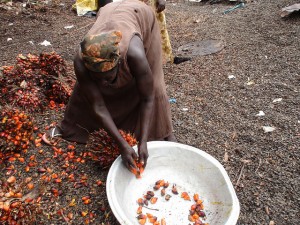Walmart hopes to base its sustainable agriculture strategy on its biggest strength: purchasing power. “What we do well is issue a purchase order,” said Beth Keck, the company’s director of sustainability during a roundtable event Friday at Johns Hopkins School of Advanced International Studies. “It’s our number one competency.”

In order to do this, the company plans to purchase and sell $1 billion of food grown by one million small and medium farmers around the world. Walmart also plans to double its sale of locally purchased produce in the U.S by the end of 2015.
“Sustainability is a business strategy, not a charitable giving strategy,” said Keck, who has been instrumental in developing the goals. “We’re thinking about sustainability from the customer’s point of view. We don’t want customers to have to choose between products that are sustainable or products that are affordable.”
The company plans to produce more food with fewer resources as part of its commitment to global sustainable agriculture. This involves focusing more on agriculture in its sustainability index, investing money in its supply chain to ensure product freshness, and reducing food waste.
Walmart is also focusing on a few key products that are sustainably grown and harvested, such as palm oil and beef. Keck said that palm oil and beef were selected because they are two of the main causes of deforestation in tropical areas. By 2015 Walmart will require only sustainably sourced palm oil in all its private brand products and beef that does not contribute to the deforestation of the Amazon rainforest.
The company’s strategy does face challenges. Keck mentioned that it cannot invest much in small farmers who do not have the necessary technical and business skills, financing, or transport services to sell to Walmart. To incorporate these farmers, the company has to rely primarily on national extension services, local NGOs, and international development organizations.
Keck said that China, India, Mexico, and Brazil are the most important countries for the international component of the strategy because of the amount of farmers and product involved. Keck also acknowledged that $1 billion represents a small portion of the roughly $200 billion in revenue from food sales that Walmart generates yearly but that she hoped the company would exceed that amount.
By Sheldon Yoder

Danielle Nierenberg, an expert on livestock and sustainability, currently serves as Project Director of State of World 2011 for the Worldwatch Institute, a Washington, DC-based environmental think tank. Her knowledge of factory farming and its global spread and sustainable agriculture has been cited widely in the New York Times Magazine, the International Herald Tribune, the Washington Post, and
other publications.
Danielle worked for two years as a Peace Corps volunteer in the Dominican Republic. She is currently traveling across Africa looking at innovations that are working to alleviate hunger and poverty and blogging everyday at Worldwatch Institute’s Nourishing the Planet. She has a regular column with the Mail & Guardian, the Kansas City Star, and the Huffington Post and her writing was been featured in newspapers across Africa including the Cape Town Argus, the Zambia Daily Mail, Coast Week (Kenya), and other African publications. She holds an M.S. in agriculture, food, and environment from Tufts University and a B.A. in environmental policy from Monmouth College.








